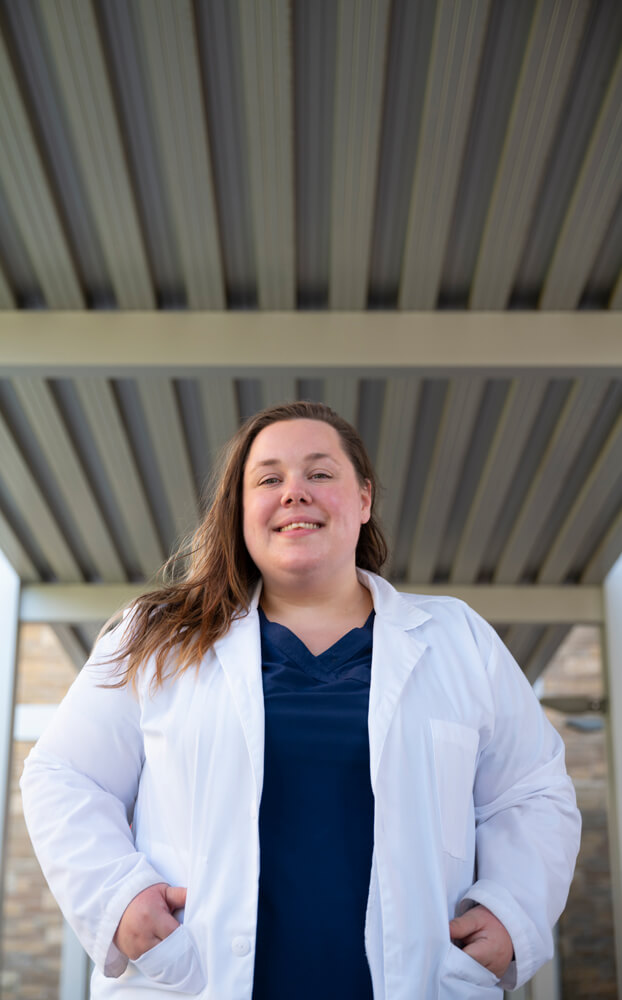
Dispatches From the Front Lines
Lauren Parks earned her master’s degree in social work in 2016. She is a medical social worker at Ocean Medical Center in Brick, New Jersey. She shares with us her experiences working in a hospital setting during the height of the COVID-19 pandemic.
We had to adapt overnight. We left work one day and everything was normal and then we came in the next day and nothing was ever the same again.
At Hackensack Meridian Ocean Medical Center in Brick, New Jersey, there are six floors and normally every floor has one social worker and one nurse working together as case managers and our job is to walk our patients through the entire process from assessment to discharge. When our COVID-19 numbers began surging in mid-March and our care model was adjusted to meet the surge and corresponding staffing demands, nurse case managers from each floor were deployed to assist at the bedside. Social workers were the only clinical professionals doing the entire psychosocial assessment to discharge planning process for the hospital.
Social workers are responsible for everything from running initial assessments, case planning, communicating with family members, working out home care needs, working with insurance companies to get proper medical equipment coverage, figuring out rehabilitation placement, walking patients through the discharge process, conducting follow-ups with patients and families, and more.
I’m looking at every patient clinically and am trying to assess what they will need—what is the medical need and what is the social need?
On my floor, I have an average case load of 40 patients. Half of them have cardiac issues ranging from chronic atrial fibrillation to chronic obstructive pulmonary disease (COPD), and the other half are COVID-19 patients, so I’ve been seeing patients from as young as in their 20s to 101-year-olds.

With COVID-19 patients, they are so sick that they need extra assistance and, if a patient recovers, they still have a long road ahead of them. Many need in-patient rehab, but placements have been difficult in the discharge planning because many rehabs have been closing their doors to protect their current patients. Before COVID-19, we typically had a list of 40 to 50 placement options that we could discharge our patients to, and now it’s down to eight or nine.
At the very least, nine out of ten patients will still need oxygen, or a walker when they’re discharged home; some need hospital beds and in-home physical and occupational therapy.
In March and April, I had been working every Sunday through Friday, picking up shifts as I could. It was hard and it’s still hard. I’ve definitely cried after work. I’ve definitely cried on the phone with families. Obviously you want to keep it together, but it’s so traumatic for these very sick patients. They’re in a room by themselves, doors closed, unable to see their families, communicating with us via baby monitors—it’s so isolating for them. My coworkers and I talk a lot about how much distress these patients are going through and how it’s so important to recognize and prepare for that.
I’ve always created relationships with my families but now more than ever—because visitors are not allowed in the hospital—we’ve been doing a lot of visitation with families via FaceTime and now most of my day is calling families and saying ‘hey, how are you?’ That’s not a part of the job per se, but my coworkers and I, just because of what we do and who we are, are asking those families: How are you doing today? What can I do to make your life easier?
I worry a lot about the nurses and the health of the front line workers. For me, I’m reading updates on the computer at my desk—I’m not in the room seeing a patient’s labored breathing or the one doing compressions when their heart stops beating. I really worry about mental health and PTSD because it has been so traumatic on so many levels for everyone affected: the family, the patient, the doctors, the nurses, the social workers.
Every professor says “every social worker needs a social worker” and it’s so true. We kind of joke about how we’re going to need a lot of therapy after this because it’s so depleting—it takes your heart and it rips it out because you’re giving so much of yourself to the family.
I foresee a positive change coming out of this in regard to treating each other like humans and being more empathetic towards one another and really reinforcing the idea that we’re all a team and we can lean on each other. We’ve all seen one another at our most vulnerable at this point and I think it’s definitely doing a lot to bring an air of camaraderie and teamwork.
I think people are going to become more human with one another. Showing a patient a little bit of empathy—that’s something they’re going to remember for the rest of their lives. They’ll remember that I showed them a little piece of hope and compassion during such an uncertain and dark time.